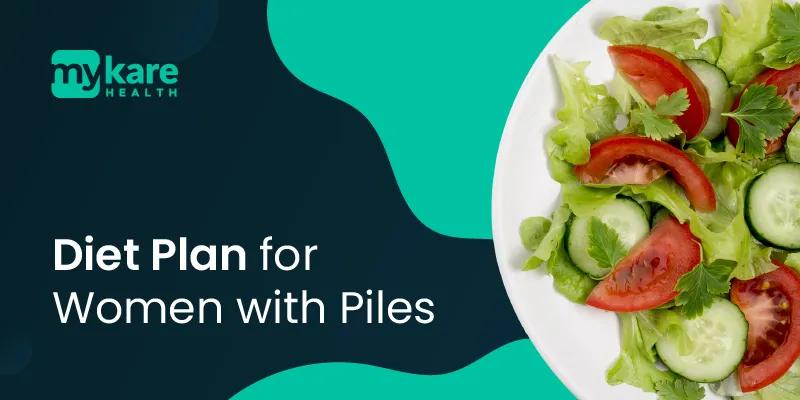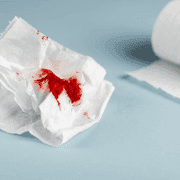Diet Plan for Women with Piles
In This Article
Diet Plan for Women with Piles
Prathibha
Updated on January 21, 2025
Medically verified by Dr. Arya
Fact checked by Dr. Fazeela

Proctology
5 min read
Piles (also known as hemorrhoids) are a common condition caused by swollen veins in the rectal or anal area. Women, in particular, face unique challenges with piles due to pregnancy, hormonal changes, and dietary habits. While medical treatments offer relief, a proper diet plays a crucial role in managing symptoms, promoting recovery, and preventing recurrence. In this blog, Mykare Health takes you on an elaborate and informative journey to explore effective strategies on how a diet plan can impact the early stages of piles and even the more advanced stages.
Understanding Piles in Women
Piles occur when the veins around the anus and rectum swell due to increased pressure, leading to discomfort, pain, itching, or even bleeding during bowel movements. Common causes include
1. Chronic Constipation: Straining during bowel movements is a leading factor.
2. Pregnancy: Increased pressure on the pelvic veins during pregnancy.
3. Low-Fiber Diet: Insufficient fiber intake makes stools harder to pass.
4. Sedentary Lifestyle: Prolonged sitting and lack of physical activity.
Why Diet is Crucial for Piles in Women
A balanced diet can
-
Soften stools, reducing pain and irritation.
-
Promote regular bowel movements, avoiding straining.
-
Provide nutrients that aid healing and reduce inflammation.
-
Prevent recurrence by maintaining gut health.
Dietary Tips for Women with Piles
1. Include Fiber-Rich Foods
Fiber is essential for preventing constipation and straining, the primary triggers of piles. Women need 25–30 grams of fiber daily.
-
Sources of Soluble Fiber: Oats, apples, pears, and flaxseeds.
-
Sources of Insoluble Fiber: Whole grains, leafy greens, and carrots.
2. Stay Hydrated
Drinking enough water is as important as fiber intake. Water softens stools, making them easier to pass. Aim for at least 2.5–3 liters daily. Herbal teas and water-rich fruits like watermelon also help maintain hydration.
3. Probiotics for Gut Health
Probiotic-rich foods balance gut bacteria, aiding digestion and preventing constipation.
- Sources: Yogurt, kefir, kimchi, and sauerkraut.
4. Anti-Inflammatory Foods
Piles often involve swelling and irritation, making anti-inflammatory foods beneficial.
-
Fruits: Berries, cherries, and citrus fruits.
-
Vegetables: Spinach, broccoli, and sweet potatoes.
-
Herbs and Spices: Turmeric, ginger, and garlic.
5. Avoid Trigger Foods
Certain foods can worsen symptoms by irritating the digestive system.
-
Spicy Foods: Can increase irritation.
-
Processed and Refined Foods: Low in fiber and hard to digest.
-
Caffeine and Alcohol: Dehydrate the body, worsening constipation.
6. Healthy Fats
Incorporating healthy fats can lubricate the digestive system and support bowel movements.
- Sources: Avocado, olive oil, walnuts, and chia seeds.
7. Eat Smaller, Frequent Meals
Instead of three large meals, opt for smaller, frequent meals to improve digestion and prevent bloating.
 5 min read
5 min readDon't Ignore Bummy Pain: Could It Be Piles?
 7 min read
7 min readBlood In The Stool: A Sign You Shouldn’t Ignore
 6 min read
6 min readSitting All Day Wreaking Havoc? It Might Be Piles!
Get a Callback Now
Timely Diet chart for Piles Recovery
Here’s a sample diet plan for piles recovery tailored to women
Morning Detox (6:30 AM)
- A glass of warm water with lemon and honey to stimulate digestion.
Breakfast (8:00 AM)
-
A bowl of oatmeal with sliced bananas, flaxseeds, and a handful of blueberries.
-
A cup of unsweetened herbal tea.
Mid-Morning Snack (10:30 AM)
-
A small bowl of papaya or watermelon.
-
A handful of roasted almonds or walnuts.
Lunch (1:00 PM)
-
A bowl of quinoa or brown rice.
-
Steamed vegetables like broccoli, zucchini, and carrots.
-
Grilled salmon or a serving of lentil curry.
-
A side of cucumber and yogurt salad.
Afternoon Snack (4:00 PM)
-
A glass of buttermilk with a pinch of roasted cumin powder.
-
A handful of roasted chickpeas or fox nuts (makhanas).
Dinner (7:30 PM)
-
Whole wheat chapati or millet roti.
-
Sautéed spinach or kale with garlic.
-
A bowl of vegetable soup or lentil stew.
Bedtime Snack (9:30 PM)
- A warm glass of turmeric milk for its anti-inflammatory benefits.
Lifestyle Tips for Managing Piles in Women
1. Exercise Regularly: Yoga, walking, and swimming improve digestion and reduce constipation.
2. Avoid Prolonged Sitting: Sitting for long periods increases pressure on anal veins. Use a cushion for added comfort.
3. Maintain Good Toilet Habits: Don’t delay bowel movements and avoid straining.
4. Wear Comfortable Clothing: Loose, breathable fabrics prevent irritation.
FAQs
1. Can diet cure piles in women?
Diet alone cannot completely cure piles, but it plays a significant role in alleviating symptoms and preventing recurrence. A high-fiber, hydrating diet promotes healthy bowel movements and reduces irritation.
2. Is high-fiber food good for piles in females?
Yes, high-fiber foods are crucial for managing piles. They soften stools, add bulk, and prevent straining during bowel movements.
3. Does drinking water help with piles symptoms?
Absolutely! Adequate water intake softens stools and complements fiber intake, making bowel movements smoother and less painful.
4. Can diet help prevent piles in females?
Yes, a balanced diet rich in fiber, water, and anti-inflammatory foods can prevent constipation, a leading cause of piles. Regular dietary habits promote overall gut health.
5. Are spicy foods bad for piles?
Yes, spicy foods can irritate the anal region, worsening symptoms like pain and itching.
6. Can pregnant women follow this diet plan?
Yes, but pregnant women should consult a doctor or dietitian to ensure the diet meets their unique nutritional needs.
7. How long does it take to see results from a diet change?
You may notice improvements in bowel movements within a few days, but consistent dietary changes are necessary for long-term relief and prevention.
Conclusion
Managing piles requires a holistic approach, with diet being a cornerstone of treatment and prevention. By following the dietary tips for women with piles and the sample diet plan for piles recovery outlined above, you can significantly improve your symptoms and quality of life.
Remember, while dietary changes are effective, consult a healthcare professional if symptoms persist or worsen. Take the first step toward comfort and healing today!
Dietary Changes are Vital: A tailored diet for piles in women can alleviate symptoms and promote healing.
Fiber and Water are Essential: Together, they ensure smoother bowel movements and reduced strain.
Anti-Inflammatory Foods Aid Recovery: Incorporate turmeric, berries, and spinach into your meals.
Avoid Triggers: Spicy, processed, and dehydrating foods should be limited.
Follow a Structured Plan: Adhering to a sample diet plan for piles recovery ensures consistent progress.
Source Links
Healthline - Diet Tips for Hemorrhoids Relief
WebMD - Foods to Help With Hemorrhoids
Medical News Today - What to Eat and Avoid for Hemorrhoids



